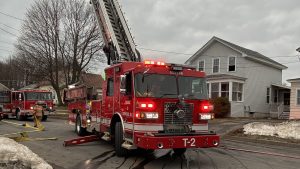UTICA, N.Y. — Thea Bowman House in Utica held a groundbreaking ceremony on Wednesday, April 3 to kick off the installation of a new elevator at its DeSales Center, 309 Genesee St.
The $1.2 million project will make the DeSales Center accessible. The facility is currently not accessible to people with varying disabilities. This has prevented some patrons from visiting the facility, limits the organization in hiring, and requires food-service personnel to walk up two flights of stairs several times a day to deliver food to the upper floors.
The new elevator will also open rental possibilities on the building’s top floor, which houses several rooms that would be suitable for nonprofit tenants. Renting the space would give those agencies room to grow while also generating much-needed revenue for Thea Bowman House.
(Sponsored)

What Is Governance, Risk Management, and Compliance (GRC)?
As cyber threats grow in numbers and severity, regulatory bodies are developing new cybersecurity frameworks for businesses to adhere to. These frameworks vary by industry, and a new type of

Latest Tax Scams and Schemes for Tax Filing Season
With the 2024 tax filing season upon us, now is a great time to remind taxpayers to stay vigilant and watch out for bogus tax strategies and schemes. Now more
“There are so many people to thank for helping us raise the funds needed for this architecturally designed elevator, and we are especially grateful for the generous grant of $250,000 from Oneida County Executive Anthony J. Picente, Jr. and the Oneida County legislators,” Thea Bowman House Executive Director Jane Domingue said in a news release. “We look forward to having full accessibility at our center for our children, parents, employees, and the community.”
Along with the $250,000 from Oneida County’s American Rescue Plan Act funds, the project also received support from private donors and the following organizations: Empire State Development Downtown Revitalization Grant ($650,000) and Consolidated Funding Application ($150,000), City of Utica Community Development Block Grant ($100,000), and CREST (Community, Resiliency, Economic, Sustainability and Technology) Program grant ($125,000). Adirondack Bank has approved a $650,000 loan for the project, repayable from the Empire State Development grant upon project completion.




